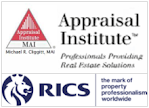The short version of this discussion is that contract rent is what is agreed to in a lease - " the contractual lease agreement" and market rent rent is what is the most likely rental rate based on market evidence/comparable rentals/leases. This is a very similar concept to the price vs. value discussion/blog. In relation to the prior price vs. value discussion, contract rent is the price an owner of property agrees to lease and the price a tenant agrees to pay as stipulated in the lease agreement. This could be based on market rent levels/market evidence or any number of factors not related to market rent. Where as, market rent is the opinion of what a property should or would lease for based on other comparable properties that have leased or are available for lease. Market rent is the most likely lease rate for a property based on the specifics of that property and how those property specifics relate to the market/other comparable rental properties.
The Appraisal of Real Estate published by the Appraisal Institute defines Contract Rent and Market Rent, as follows:
"Contract Rent is the actual rental income specified in a lease."
"Market Rent is the rental income that a property would probably command in the open market; indicated by the current rents that are either paid or asked for comparable space as of the date of the appraisal."How is this applied in the appraisal process.
The income/rent the property generates and/or can generate is analyzed in the Income Approach to value. In a standard "commercial real estate appraisal" (non-single family property) the Income Approach is one of three approaches to derive value of real estate and the analysis of market rent is only one step in the Income Approach in deriving a value for a property.
Depending on the type of assignment and the specifics of the property, both the contract rent and market rent can be analyzed, or just one may be analyzed. If market value is sought then market rent should typically be determined and analyzed and if the property is leased then market rent should be compared to the contract rent as the market value can be impacted by a difference in the terms of market rent vs. contract rent. If interested, see the previous discussion/blog on fee simple interest for how contract rent and market rent can impact the fee simple and/or leased fee values of property.
Beyond a typical appraisal, a "market rent study" or "market rent appraisal" can be conducted if only the appropriate rent is in question or sought. In this case an "independent, third party - appraiser" is brought in to estimate/derive fair market rent only and the value of the property is not needed.
There are many reasons why a market rent study is requested, such as in a business partnership situation where one partner owns the real estate and the fair market rent is needed to confirm that the appropriate amount is being paid. A tenant in a property may request to have a rent study done to help in negotiations with the landlord when nearing a lease renewal or when signing a new lease for a property to make sure they are not paying more than typical or to provide to shareholders in the business that the lease rate being paid by the business is appropriate. An owner/landlord may want to confirm that they are charging appropriate rents to their tenants based on comparable properties in order to minimize the risk of vacancies or to know their potential income exposure if a lease renewal is approaching. An investor may want to know what the most probable rents for a potential investment are in order to utilize in their investment calculations as part of their due diligence prior to closing on an investment property. There are a multitude of reasons for having an "independent, unbiased, third party - appraiser" determine the appropriate market rent for a property. If the fair market rent is in question, then a market rent study may be in order.
If you have questions regarding market rent and/or contract rent or if you think that you might need a market rent study and/or appraisal we are available to assist.
Please feel free to contact us.
Cliggitt Valuation, Inc.
Real Estate Analysts and Advisors
Based in Central Florida (Lakeland, FL)
863-661-1165
www.cliggitt.com


